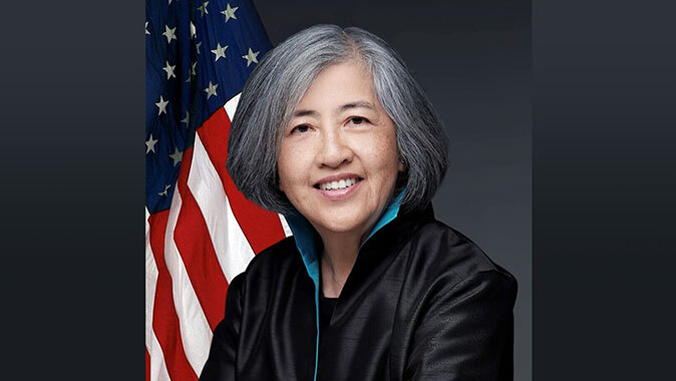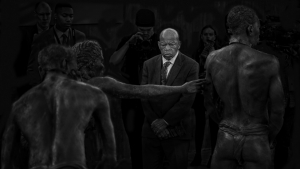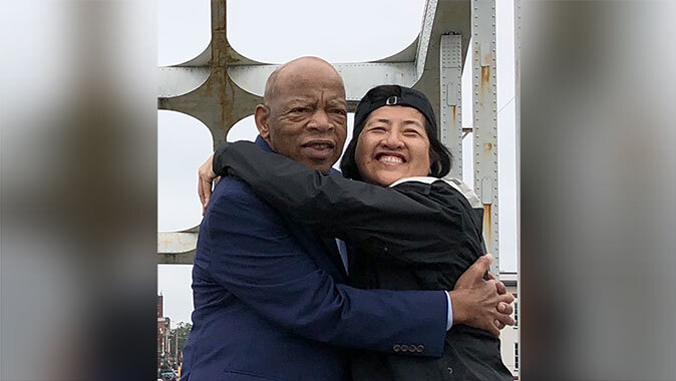
Chantale Yokmin Wong has been appointed to high-level positions by three U.S. presidents and has served in other executive government roles. Her passion for public service was first sparked at the University of Hawaiʻi at Mānoa when she was a student.
Wong is the U.S. executive director of the Asian Development Bank (ADB) with the rank of ambassador. ADB supports social and economic development in Asia, and helps to eradicate poverty in the region. She was nominated for her current position by President Joe Biden and was confirmed by the U.S. Senate in February 2022. After Senate confirmation, Wong became the first LGBTQ+ person of color and the first out lesbian to hold the rank of ambassador in the U.S.
“It is important to be the first ever but let me not be the last,” Wong said. “It’s very lonely being the first one. We need more of me to really join the ranks, but it also impacts the kind of work I do because representation matters. President Biden who nominated for this role is clear that our foreign assistance be non discriminatory but the economic argument is also clear—the LGBTQ community is often the most vulnerable of the vulnerable, and there are plenty—many in the countries the organization I work at now—where the LGBTQ community are discriminated against and targeted and therefore their access to education and health services are restricted.”
Wong earned her undergraduate degree in civil and structural engineering from UH Mānoa’s College of Engineering in 1980. While at UH, she worked her way through college, earning scholarships and serving as a cashier at the East-West Center cafeteria. She knew what it was like to work hard, while also relying on the help from others.
“The difficulties and challenges of what I had faced just reminds of what it means to me working in the space that I am now helping those in need much like I was helped,” Wong said. “Because I was on my own, I had to figure out where to get food or tuition. …When I got here, starting at the University of Hawaiʻi, I always had professors who took care of me.”
Finding her future at UH
Wong had a turbulent childhood. She escaped Shanghai at the age of six with her grandmother and lived with her aunt and uncle in Macau. Wong eventually found her way to Okinawa and Guam, where she attended high school. However, after her aunt died between Wong’s junior and senior years, she needed to figure out her post-graduation plans. It was through a scholarship with the Society of American Military Engineers in Guam that had a tie to UH that she found her way to Mānoa. Wong was a successful student in the classroom and worked summer jobs, including surveying pineapple fields on Maui.
“All of that was helpful as I thought of all the people that helped me along the way. That’s what got me through. So I turn it around and I pay it forward a lot,” Wong said.
One of the ways Wong has paid it forward was founding the Conference on Asian Pacific American Leadership more than 30 years ago. The organization seeks to empower Asian American, Native Hawaiian and Pacific Islander (AANHPI) youth to seek careers in public service and building a strong AANHPI public service pipeline.
Path to Washington, D.C.
After graduating from UH, Wong headed to the continental U.S., earning her master’s in public administration from Harvard University and master’s in environmental engineering from the University of California, Berkeley.
Wong was appointed by President Bill Clinton to the Board of Directors at ADB, representing the U.S. as the alternate executive director. She was appointed by President Barack Obama to serve as vice president for administration and finance and chief financial officer at the Millennium Challenge Corporation, where she led change in financial, human capital and information technology management. Wong has also held senior appointments in the U.S. Office of Management and Budget, U.S. Department of the Treasury, NASA and the Environmental Protection Agency.
“We are living in very difficult and challenging times in the region,” Wong said. “Some countries have recovered from COVID and there are many others that are still struggling. The debt overhang in many of these countries—they borrowed extensively not only from the international institutions like ADB or the World Bank, but also bilaterally. So there are now countries in a debt crisis. And Russia’s invasion of Ukraine has caused huge disruptions in fuel prices and in food costs. Climate change is real in many countries. So these are huge challenges that we are dealing with in the region.”
A year now into her role and with COVID restrictions lifted in many countries, Wong is taking to the road to visit many countries that are a part of ADB. She will visit the three Freely Associated States to the U.S.—Republic of the Marshall Islands, Federated States of Micronesia and Palau, along with seven other members of the ADB Board of Directors. Wong also had a stopover in Honolulu to attend briefings on the role and impact of Hawaiʻi to the three island countries. The purpose of this visit was to see first hand the particular development challenges of Pacific Island nations.
Chronicling civil rights movement

Wong briefly retired from public service in 2014 and took up a new hobby: photography. She purchased camera gear and chronicled many events, including the Martin Luther King, Jr. ceremony in Washington, D.C. in 2016. There, she connected with a friend who also worked during the Obama administration. Her friend was part of the Faith and Politics Institute, which organized pilgrimages with the late Congressman John Lewis, and invited her to participate and take photos.
Wong studied the history of King, Jr. and the civil rights movement, and for the last four years of Lewis’ life, Wong documented the annual pilgrimage to Selma, Alabama. She also befriended a number of civil rights leaders and icons, including the daughter of Viola Liuzzo, who was the only white woman killed by the KKK, because she heeded the call by King, Jr. to come and help during the Montgomery bus boycott.
“One of my photos is a beautiful photo of [Lewis] standing in front of the slave statues in the lynching memorial in Montgomery, Alabama,” Wong said. “He stood for a moment thinking about the plight of his people, the slaves—the mass incarceration of African Americans. He stood there for five minutes. I saw that scene from the top of the hill, I ran like a crazy person and took this shot. I had this beautiful shot printed, framed and given to him, and his staff told me he wept.”
—By Marc Arakaki


